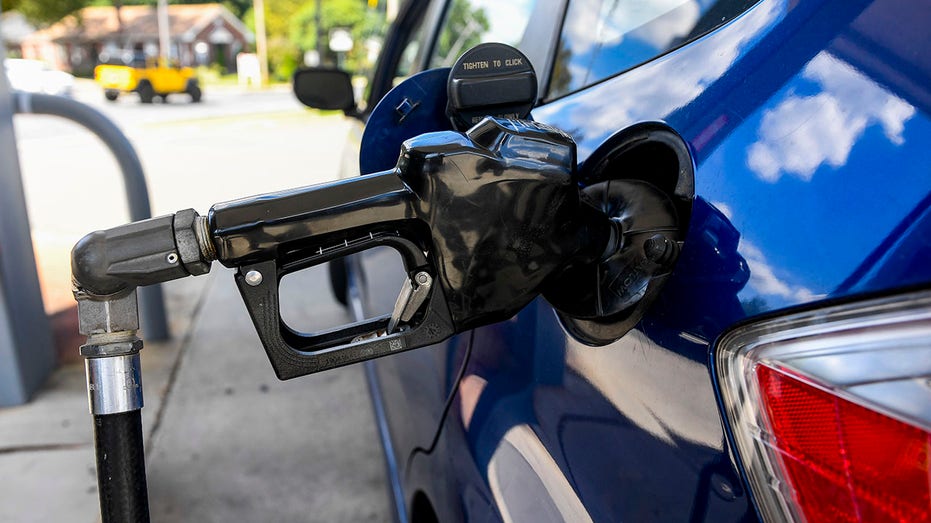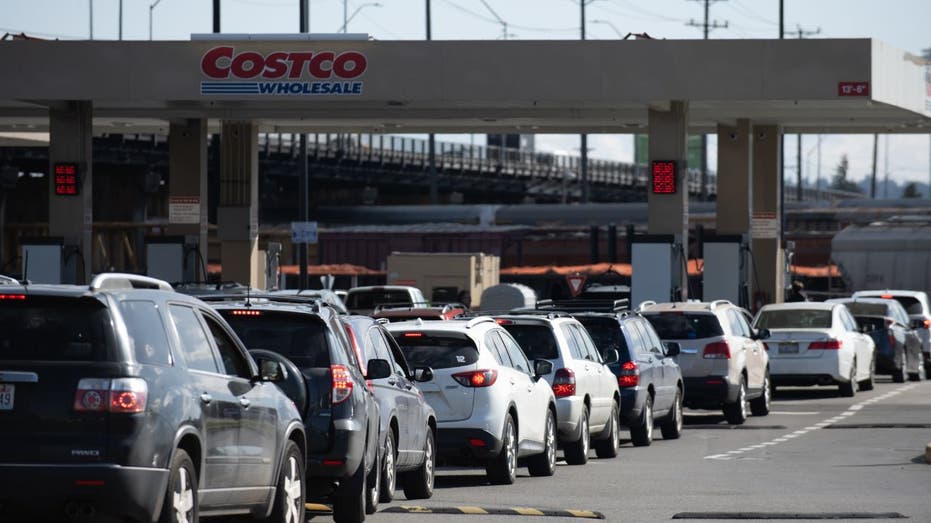How can gas prices come down? The federal government and states could help ease pain at the pump
There are a number of things the federal government could do right now, according to an economist
Former oil exec has 'never seen anybody as inept in energy as the Biden administration'
Joe Petrowski, former CEO of Cumberland Farms Gulf Oil Group, explains the 'very easy' way the U.S. can reclaim energy independence once again.
As gasoline prices continue to surge in the U.S., Americans are feeling the pain and wondering when there might be some relief.
While no one knows when prices might come down amid soaring inflation and Russia's war on Ukraine, there are a number of actions that could be taken to help bring the cost of a gallon of gas back down to earth.

The fuel nozzle in a car at a gasoline pump at the Citgo gas station on Lancaster Ave in Reading, PA. (Ben Hasty/MediaNews Group/Reading Eagle / Getty Images)
In an effort to combat soaring gas prices, the Biden administration has already released tens of millions of barrels of oil from the Strategic Petroleum Reserve, but it has not been enough to have an impact. Meanwhile, the administration's ban on Russian energy imports further tightened supply.
The White House has asked OPEC to pump more oil, but the cartel has been resistant, and officials are now making public pleas for domestic producers to ramp up drilling.
FORMER OIL EXEC: KEYSTONE, OTHER PIPELINES ‘VERY EASY’ WAY TO RESTORE US ENERGY
Pumping more oil to meet demand will be critical in easing prices, but it is not a quick fix according to Nick Loris, vice president of public policy at the Conservative Coalition for Climate Solutions (C3 Solutions).
Domestic oil and gas firms have already been ramping up production for months, and U.S. production is likely to break records either by the end of the year or in early 2023, "which, for drivers today, is a long time away," Loris told FOX Business.
But Loris says there are several actions the federal government could take now to lower gas prices for Americans in the near term:
Suspend summer blends requirements
Refiners in the U.S. are required to switch to higher-grade summer gas blends in warmer months to reduce gas evaporation. Loris says the Biden administration waiving this requirement could save consumers up to 15 cents per gallon.
DAVE RAMSEY ON HIGH GAS PRICES AND 6 WAYS TO SAVE MONEY
Gas tax holiday
Loris says that the Biden administration could suspend the federal gas tax of 18.4 cents per gallon, and governors could have an even greater impact by suspending their own state gas taxes. In California, for instance, the total state tax on a gallon of gas is 58.8 cents.

A customer refuels a vehicle at a Costco gas station in the South of Downtown (SoDo) neighborhood of Seattle, Washington, U.S., on Wednesday, March 9, 2022. (Photographer: Chona Kasinger/Bloomberg via Getty Images / Getty Images)
Lift the ethanol mandate
The U.S.'s Renewable Fuel Standard requires refiners to blend corn ethanol with gasoline. But ethanol is more expensive and less efficient than gas, so adding the biofuel artificially drives up the cost at the pump.
Waive Jones Act requirements on oil imports
The Jones Act is a law regulating maritime commerce, which mandates that oil shipped between U.S. ports must be transported on U.S.-built vessels with a crew that is at least 75% American, making U.S. crude more expensive to ship.
HOW HIGH WILL GAS PRICES GO? EXPERTS WEIGH IN
Lifting the requirement would not only reduce the pain at the pump, according to experts. An American Enterprise Institute study from 2020 found that similar restrictions on food aid drove up transportation costs by 60%, and increased bulk shipment costs by 150%.

Vehicles wait in line to refuel at a Costco gas station in the South of Downtown (SoDo) neighborhood of Seattle, Washington, U.S., on Wednesday, March 9, 2022. (Photographer: Chona Kasinger/Bloomberg via Getty Images / Getty Images)
Loris says that the Biden administration isn't entirely to blame for the high energy prices but that it could help ease prices in the longer term by changing course on its anti-fossil fuel policies, pointing to the president blocking the Keystone XL Pipeline and halting new federal land leases as moves that created further uncertainty in energy markets and discouraged investment.
GET FOX BUSINESS ON THE GO BY CLICKING HERE
"It's really a combination of oil companies being a little hesitant to go to Wall Street, and Wall Street being a little hesitant to jump in and go full throttle again," Loris says.





















